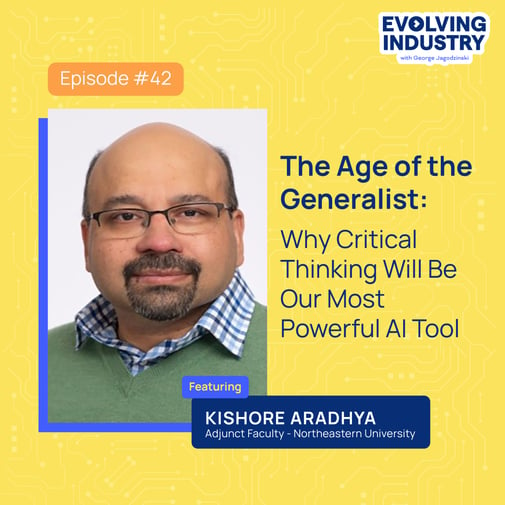Evolving Industry
Kishore Aradhya, an adjunct professor at Northeastern University’s College of Engineering, is teaching his students to ask one simple question when categorizing AI tools.
“What problem are you trying to solve?”
With decades of experience as a software engineer at companies like Staples, Bose, and Stanley Black & Decker, Kishore explains why flexibility and critical thinking will be essential in an AI-empowered workforce.
Kishore talked with us about:
- The need for programmers to develop a problem-oriented mindset
- How AI will help businesses navigate large organizational shifts
- Why choosing specializations will be difficult for future talent
AI Tools Should Supplement a Need
Some experts predict that the AI global market could be worth over $1.8 trillion by 2030.
As exciting new AI tools continue to infiltrate the workforce, how do business leaders and their teams determine which ones will actually drive value to their operations?
This conundrum is why Kishore teaches his students to approach AI applications with a problem-oriented mindset.
“As you enter the workforce, no matter where it is, everybody will have their own pet tool, if you will, that they want to use or that they would like to use,” he said. “You should always question everything in terms of, ‘What problem is it trying to solve?’”
Yet with so many shiny toys to choose from, Kishore knows his future programmers could easily become overly ambitious.
So he leans on an age-old engineering principle to help them stay grounded.
“The best code written is the one that’s not,” he argued. “At the end of the day, it’s less maintenance. It’s the same thing they need to apply in the data engineering world, as well.”
These potential pitfalls are why Kishore believes critical thinking will ultimately be a paramount soft skill for the programmers of the future.
“Critical thinking is important. You need to know the fundamentals other than just [letting] the tool do the work for you and think it's going to solve the problem.”
AI Will Help Drive Organizational Shifts
As large companies pivot from B2B into B2C offerings or break into e-commerce, data management creep can quickly overwhelm their operations.
“I hate to use this [phrase] ‘digital exhaust, but it’s one of those things. The existence of a business creates this data inherently,” Kishore said. “One of the challenges is how do you detect the signal [in] the noise?”
One strategy Kishore has successfully implemented in the past to overcome this hurdle is using knowledge graphs to track how internal systems relate to one another.
“You start to realize that not only [are] the entities themselves critical, but the relationships between the entities are equally, if not more, critical,” he explained.
However, these knowledge graphs often involve extensive computational elements that are far outside the capabilities of key personnel.
“The folks who are using these tools, or using these mechanisms, are very different,” Kishore said. “They may not be [as] digitally savvy as you would expect them to be, but they know a good product when they see it. So the question then becomes, ‘How do you incorporate these signals into these machines?’”
He implied that that’s where AI comes into play.
“You’re going to see a lot of these intersections of how LLMs can build knowledge graphs,” he said. “Then you get real data faster.”
Adaptability Will Be Essential in an AI-empowered Workforce
When asked about his feelings on his students’ future, Kishore suggested that the days of software engineers leaning on one programming language are behind us.
While he acknowledged a need to understand, in his words, “standard CS stuff,” Kishore believes the programmers of the future can’t afford to get tunnel vision.
“Nowadays, your knowledge should be so varied. It needs to be a lot broader than [it] used to be because there [are] so many touchpoints in which things are happening.”
Yet just like with the AI tool enigma, Kishore thinks choosing what areas to focus on will be a big challenge for his students going forward.
“I find myself having these conversations with the students, like, ‘What about this? What about this? I want to do this,’” he lamented. “Yes, you can go after doing so many different things. But then you're going to lose sight of what you are focusing on, [so] I think it's a huge challenge, honestly.”
Ultimately, though, Kishore thinks versatility will prevail. That’s because he shares the prominent opinion that we’ve crossed a monumental threshold in human achievement, comparing it to the rise of the internet.
“We saw the evolution of that to where we are today,” he said. “In all of humanity, I don’t think we have seen this kind of disruption that is going to come our way.”
Craving more? You can find this interview and many more by subscribing to Evolving Industry on Apple Podcasts, on Spotify, or here.
